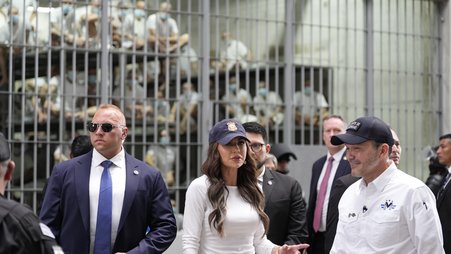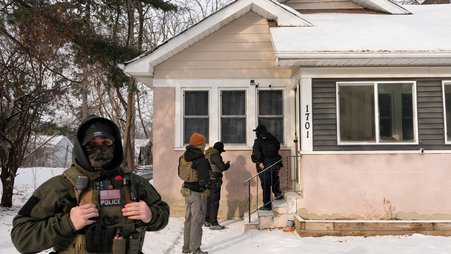We're republishing Marcy Wheeler's coverage of the trial of CIA whistleblower Jeffrey Sterling. The following post first appeared at ExposeFacts.
Today the government and the defense presented their opening arguments in the Jeffrey Sterling case. As laid out in this post, Sterling faces 10 charges — mostly charges related to the Espionage Act — for allegedly leaking information on Operation Merlin to New York Times reporter James Risen.
In the government’s opening. Jim Trump started by claiming that Sterling had betrayed his company, his colleagues, and most of all the Russian who had served an operational role in the plot to deal dubious nuclear blueprints to Iran.
He said the government would present two or three main points in its case:
- It would prove the information about the operation was “national defense information.”
- It would describe how the CIA came to be aware the story got leaked.
- It would explain why this leak was so important, because it could “potentially damage national security.”
Trump would use that phrase — “potentially damaging to national security” — at least once more in his opening
Trump spent much of the rest of his opening attacking the story of Operation Merlin as told by James Risen. He claimed that, contrary to what Risen presented, no one found the flaws in the nuclear blueprints CIA dealt Iran — experts from our own nuclear labs had ensured that. The prosecutor insisted that the Russian had been told the blueprints were “incomplete,” not “flawed,” as Risen reported. Trump also emphasized that Risen was told — when he spoke with the CIA’s Bill Harlow about the story in 2003 and when Condi Rice successfully convinced the Timesnot to run the story —that the operation was still ongoing.
Trump then laid out why the government is so sure Sterling served as a source for Risen (at times, he implied “the source” for Risen). Sterling (in a conversation with the Senate Intelligence Committee) and Risen (in his book) were the only ones who had ever referred to the plans being “flawed” as opposed to “incomplete.” The story was told through the perspective of a case officer who was Sterling, Trump claimed. Only Sterling would know about some details — such as a trip to Northern California’s wine country — described in the book. Sterling would not have access to other details about which (Trump claimed) Risen speculated, such as whether the operation continued.
And Sterling “had motive,” Trump claimed: that he was bitter the CIA did not settle his Equal Opportunity claims.
Jeffrey Sterling’s defense lawyer, Edward MacMahon, started by throwing out a bunch of details meant to generate empathy. Sterling is “not a traitor,” He was the first in his family to go to college. “This process has been going on for 13 years.”
But then he turned it back onto the CIA. “A criminal case is not a place where the CIA gets its reputation back,” he said, suggesting the CIA only pursued this case because James Risen made them look bad. MacMahon reminded why the CIA would be so sensitive about such issues in 2003, when Risen first tried to publish a story about Operation Merlin. He reminded the jury of the flawed case CIA had made about WMD.
Then MacMahon provided the jury an image of the law. They should serve, he said, as “a check against the government that’s been making these claims for years. And MacMahon laid out the series of perfectly legal efforts his client had made that, the government argues, is why he was so angry. He brought a legal Equal Opportunity case. He then sued, only to have the CIA to dismiss it by claiming national security. He tried to publish a book, only to have the CIA refuse him his ability to publish it. Any pattern, MacMahon argued in response to the government’s claim that a pattern of communication linked Sterling and Risen, was the pattern under which Sterling made perfectly legal complaints against the CIA.
After showing how little evidence the government would present about Sterling’s communications with Risen, MacMahon then mocked the government’s claims about Risen. He mocked the government’s description of the “evil person who printed this book” [State of War]. He noted how, in testimony last week and in a pitch to his publishers, Risen described talking to CIA officers, plural, for the book. MacMahon previewed a taped deposition from the Russian, who read in accented English the language that appeared in Risen’s book, but claimed, “it’s a correct quote, but I never talked to him.” And he wondered whether the government believed Risen made up all the details, in various chapters in his book, about the CIA. “What is Mr. Risen? Is he a fabulist?”
MacMahon ended his opening argument by pointing to two other people who might be Risen’s sources. First, “Bob S,” who managed Operation Merlin from CIA’s Counterproliferation Division in Langley, knew everything that appeared in the chapter, but the government just took his word that he never spoke to Risen.
MacMahon then raised the possibility that Vicki Divoll, one of the staffers with whom Sterling spoke at the Senate Intelligence Committee in 2003, might be the source. He described how, just weeks after meeting with Sterling, Divoll was fired from her job on SSCI in conjunction with another Risen story.
“Why is it,” MacMahon asked, “only Mr. Sterling the government can think of” as a potential Risen source?
In their opening arguments the government presented and the defense poked holes in an extensive, but circumstantial, case. But that’s not the government’s burden: they don’t have to prove that Sterling was Risen’s only source, just that he did leak “defense information” to Risen.




